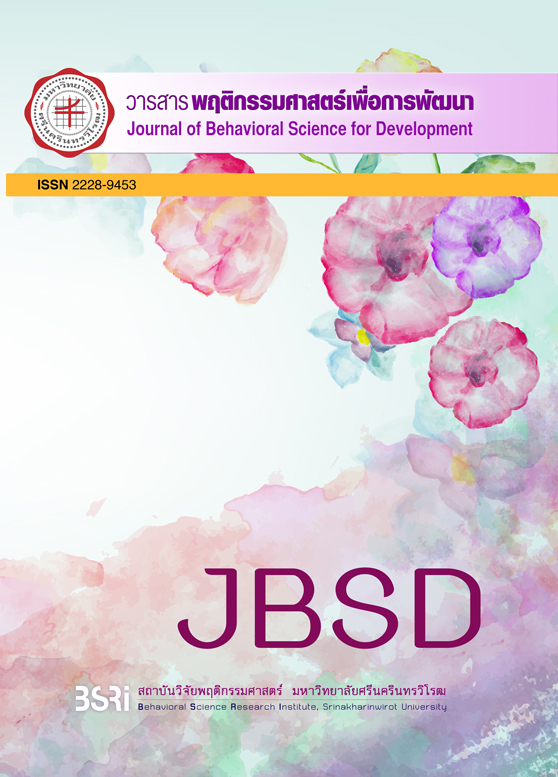Psychological Characteristics and Work Situations as correlates of Teachers’ Sufficiency Economy Socialization ปัจจัยเชิงเหตุด้านจิตลักษณะและสถานการณ์ในการทำงานของครูที่เกี่ยวข้องกับ พฤติกรรมการปลูกฝังอบรมนักเรียนตามแนวปรัชญาเศรษฐกิจพอเพียง
Keywords:
teachers’ socialization, sufficiency economy, achievement motivation, psychological sufficiencyAbstract
The objective of this study was to examine the relationships of the teachers’ sufficiency economy socialization with psychological traits, social situational factors, and psychological states. A sample of 450 teachers from both schools with sufficiency model and schools without sufficiency model. Based on the Interactionism Model as a conceptual framework. There was a total of 19 variables. The thirteen summated rating scale type of measures were constructed to collect the data. Standard Multiple Regression Analysis was used to analyze the data. Research finding were as follows: Eleven variables were found to be predictive of all two types of the teachers’ sufficiency economy socialization both in the total sample and in the various subsamples. 1) Teachers’ saving socialization behavior, the variables could account for 41.1 to 52.9%: the important predictors were social support from the significant others, achievement motivation, future orientation and self-control and perception of the benefits from sufficiency economy training. 2) Teacher’ optimize use of resources socialization behavior, the variables could account for 41.7 to 57.1%: the important predictors were achievement motivation, social support from the significant others and psychological sufficiency.
Keyword: teachers’ socialization, sufficiency economy, achievement motivation,psychological sufficiency
บทคัดย่อ
การวิจัยนี้มีจุดมุ่งหมายเพื่อศึกษา ปัจจัยเชิงเหตุด้านจิตลักษณะเดิม สถานการณ์ในการทำงาน และ จิตลักษณะตามสถานการณ์ที่เกี่ยวข้องกับพฤติกรรมการปลูกฝังอบรมนักเรียนตามแนวปรัชญาเศรษฐกิจพอเพียง กลุ่มตัวอย่าง คือ ครูที่สอนอยู่ในโรงเรียนแบบอย่างพอเพียง และโรงเรียนที่ไม่ใช่แบบอย่างพอเพียง รวม 450 คน ใช้รูปแบบทฤษฎีปฏิสัมพันธ์นิยมเพื่อกำหนดตัวแปรเชิงสาเหตุ และใช้สถิติการถดถอยพหุคูณแบบมาตรฐาน ผลการวิจัยพบว่า ตัวแปรทั้ง 11 ตัว สามารถทำนายพฤติกรรมการปลูกฝังอบรมนักเรียนตามแนวปรัชญาเศรษฐกิจพอเพียงรายด้าน ทั้งในกลุ่มรวมและกลุ่มย่อยได้ดังนี้ 1) ทำนายพฤติกรรมการปลูกฝังอบรมนักเรียนด้านการประหยัดค่าใช้จ่ายและออมเงิน ได้ระหว่างร้อยละ 41.7 ถึง 52.9 พบตัวทำนายสำคัญ คือ การสนับสนุนทางสังคมจากคนรอบข้าง แรงจูงใจใฝ่สัมฤทธิ์ ลักษณะมุ่งอนาคต – การควบคุมตนและประสบการณ์ที่ได้รับจากการฝึกอบรมตามแนวปรัชญาเศรษฐกิจพอเพียง 2) ทำนายพฤติกรรมการปลูกฝังอบรมนักเรียนด้านการใช้ทรัพยากรอย่างคุ้มค่าได้ระหว่างร้อยละ 41.4 ถึง 57.1 พบตัวทำนายสำคัญ คือ แรงจูงใจใฝ่สัมฤทธิ์ การสนับสนุนทางสังคมจากคนรอบข้าง และจิตพอเพียง
คำสำคัญ: พฤติกรรมการปลูกฝังอบรมนักเรียน เศรษฐกิจพอเพียง แรงจูงใจใฝ่สัมฤทธิ์ จิตพอเพียง




